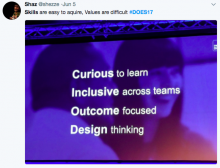This week, DevOps professionals gathered in San Francisco to talk about the state of DevOps in the enterprise. At 1,400 attendees, the sold-out DevOps Enterprise Summit has doubled in size since 2014 – a testament to the growth of the DevOps movement itself.
With an ear to this event and an eye on the explosion of tweets coming out of it, here are five key priorities we think IT leaders should be aware of as they take their DevOps efforts into the new year.
1. Developing transformational leadership skills
The role of the transformational leader was a major theme, as speakers explored the need for leaders who are ready to change and take risks to help create the culture and environment necessary for DevOps to thrive. Steve Mayner, agile coach and DevOps consultant, led a session diving into the four quadrants of transformational leadership: creativity, vision, authenticity, and growth. Transformational leadership also means recognizing that change is constant, he noted.
Nicole Forsgren, CEO & Chief Scientist at DevOps Research and Assessment (DORA), also took the stage to discuss transformational leadership, presenting five dimensions of high-performing leaders: vision, intellectual stimulation, inspirational communication, supportive leadership, and personal recognition. High performers who embody these traits are twice as likely to achieve or succeed, according to her research on DevOps teams.
[ See our related article, Transformational Leadership: 5 big mistakes execs make. ]
2. Improving your ability to learn from mistakes
One session that sparked "mind-blown" posts on Twitter came from John Allspaw, former CTO of Etsy, who tackled coping with complexity. When issues arise, his advice: Be willing to dig deep in figuring out what went wrong and what good things prevented slip-ups from getting worse. That’s how you can achieve a better shared understanding and move toward success in the future. Highly quoted from his session: “Incidents are unplanned investments in your company’s survival.”
3. Tackling culture - and middle managers
What are the top DevOps challenges right now? Culture change, tearing down siloed organization structures, and managing technical debt top the list. Interestingly, with all the attention on transformational leaders at the top of organizations, DevOps teams are struggling with middle managers. As several conference speakers noted, this is the group most resistant to change when adopting a more agile approach. So it's worth spending more time and energy training middle managers on the value of DevOps.
[ See our related article: 5 ways to nurture DevOps culture. ]
4. Growing your own talent
When it comes to people, DevOps leaders should focus on growing talent from within rather than just looking elsewhere for DevOps skills. In a DevOps environment, culture is key to talent retention – and measuring employee satisfaction could be an indicator of your ability to scale DevOps and Agile practices, as speakers reminded the audience.
Regarding specific skills for DevOps teams, speakers pointed out the value of soft skills vs. technical skills. As Hiscox CTO Jonathan Fletcher put it, “Attitude > Technology Skills.”
[ See our related article, DevOps Jobs: How to spot a great DevOps Shop. ]

5. Emphasizing the need for urgency
2018 will be the year of enterprise DevOps, according to Forrester, with 50 percent of organizations implementing it now and another 27 percent planning to do so in the next 12 months. The wait-and-watch time has ended, as evidenced by conference presentations on DevOps results by Disney, Walmart and KeyBank. As Forrester principal analyst Robert Stroud put it, DevOps is not just the driver of digital transformation, it’s the fuel.

Read also: The 7 habits of highly effective DevOps





Comments
Nice article Carla. All the points mentioned is very important. Most organizations who have started getting into DevOps feels using the tools is good enough. We need strong senior management sponsorship to change the way of doing things and hence change the culture.
Great points, Carla, and a very interesting read.
How would any of these points shift (or would they?) if the company you are talking about is is web development agency without an IT dept per-se, out of which to grow the culture of DevOps? Can the same "Growing your own talent" rule apply? Your point was reinforced in the "How to spot a great DevOps shop" article you linked to: “A great ‘DevOps shop’ will not have a separate DevOps team and no-one will have DevOps in their job title,” [Chris] McFadden says. “This is a mistake more mediocre organizations can make..."
Would you say the same points are valid, and that growing that culture within the dev team is the right approach? Certainly many of the tools are in their areas of expertise, and certainly the improvements in process and project success would be clear to them as the pain points are now.
Maybe I'm putting too much on my perceived difference in "Dev" vs. "IT" terms.